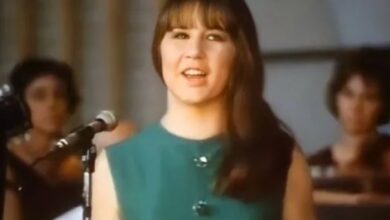The Statler Brothers’ “I’ll Go to My Grave Loving You” Becomes a Defining Moment in Country Harmony and Sentiment (1975)
Released in 1975, “I’ll Go to My Grave Loving You” by The Statler Brothers wasn’t just another country love ballad—it was a haunting declaration of devotion that hit America’s emotional core. The single quickly climbed the Billboard Hot Country Singles chart, reaching No. 3 and staying in the Top 10 for weeks. Its solemn promise and ethereal harmonies set it apart from the lighthearted fare that often dominated the airwaves, securing its place as one of the Statler Brothers’ most impactful songs.
The Statler Brothers—Don Reid, Harold Reid, Phil Balsley, and Lew DeWitt—had already earned a name in country music by the mid-1970s, largely through their connection with Johnny Cash, who had introduced them to national audiences during his television show and tours. Formed in Staunton, Virginia, the group stood out not only for their crisp four-part harmonies but also for their unique ability to blend nostalgia, faith, and storytelling in their songs. Their blend of gospel roots with contemporary country made them a rare act capable of bridging generations.
The inspiration behind “I’ll Go to My Grave Loving You” came from Harold Reid, the group’s bass vocalist and resident songwriter. Based on an earlier song he wrote titled “He Went to the Cross Loving You,” the tune was reshaped into a secular love song while maintaining its solemn spiritual tone. Reid’s lyrics captured a kind of unwavering commitment that felt almost biblical in its weight, and the result was a love song wrapped in reverence rather than sentimentality.
Produced by Jerry Kennedy—who helped shape the Statlers’ Nashville sound—the track was recorded with a sparse arrangement that allowed the vocals to remain front and center. A soft acoustic guitar and subtle steel accents created a quiet backdrop, letting the harmonies rise like a hymn. Don Reid’s lead vocal was full of restrained emotion, while Harold’s deep bass anchored the arrangement, giving the song a gospel-like structure that made it feel timeless.
Upon its release, critics praised the Statler Brothers for returning to the kind of emotional gravity that had defined early country music. Fans responded in kind, pushing the single up the charts and flooding radio stations with requests. Though it didn’t reach No. 1, its longevity on the charts and its immediate resonance with audiences made it one of the group’s most memorable hits. It also helped cement their reputation for being more than novelty songwriters or comic relief.
“I’ll Go to My Grave Loving You” arrived during a transitional period in country music, as the genre began embracing more pop-influenced sounds. Yet this song served as a quiet protest against that trend. Its traditional sound, paired with its spiritual intensity, reminded audiences—and the industry—that country music could still offer sincerity without spectacle. It was a touchstone moment that drew listeners back to the genre’s roots.
For The Statler Brothers, the song represented a turning point. Although they had previous hits like “Flowers on the Wall,” this release marked a mature shift in their catalog—a move from novelty and nostalgia toward deep, emotional storytelling. It opened doors to more serious material in future albums and expanded their appeal beyond country radio, attracting audiences who appreciated the blend of gospel purity and romantic conviction.
The influence of “I’ll Go to My Grave Loving You” extended beyond the group. The song’s structure and sentiment echoed in the work of groups like Alabama and Restless Heart, who would later fuse tight harmonies with heartfelt narratives. It also became a go-to template for younger quartets attempting to marry vocal depth with country storytelling.
The track has seen numerous covers, including renditions by southern gospel groups and traditional country acts. While none matched the commercial success of the Statlers’ version, these tributes underscored the song’s cross-genre appeal. Each version leaned into the song’s sacred tone, affirming that its strength lay in its emotional honesty rather than its musical complexity.
At the time of its release, the Statler Brothers were experiencing both personal and professional highs. The song’s success coincided with their growing visibility on television and in concert halls, and it deepened the group’s standing as country music storytellers. While their repertoire included humorous and nostalgic tracks, this ballad showed a side of them that was solemn and reverent—qualities that audiences embraced.
Decades later, “I’ll Go to My Grave Loving You” remains a signature song in the Statlers’ legacy. It has become a staple on classic country radio and a favorite at funerals, anniversaries, and vow renewals—any occasion where lasting love is the theme. Its ability to transcend time and speak to the human need for devotion has kept it relevant well beyond its original chart run.
In the larger landscape of country music, the song helped preserve the value of vocal harmony at a time when solo artists dominated the airwaves. It reminded listeners of the genre’s spiritual underpinnings and the emotional power of restraint. Where other love songs might shout, this one whispered—and it was the whisper that lingered.
Following the retirement of the group in 2002 and the death of Harold Reid in 2020, the song has taken on an even more bittersweet resonance. It stands as a tribute to the brotherhood and harmony that defined the Statlers’ sound, and as a farewell to a voice that anchored one of the most distinctive acts in country history.
What makes “I’ll Go to My Grave Loving You” endure isn’t just its melody or message—it’s the feeling that it was never meant for radio hits alone. It’s a promise spoken softly, a vow set to music, and a reminder that the deepest emotions don’t require grand gestures. Sometimes, all they need is a steady voice and the strength to carry them through a lifetime.





